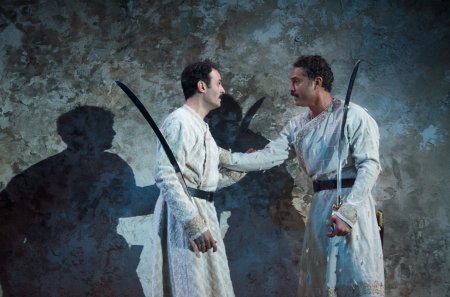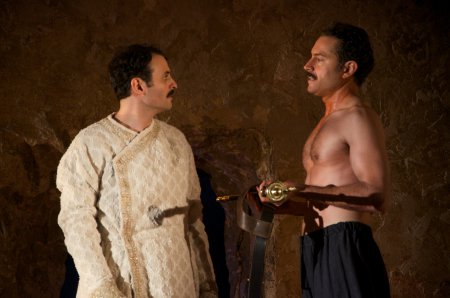Guards at the Taj
Engrossing world premiere of latest Rajiv Joseph play is both dramatic and shocking as it investigates several philosophical themes in an ancient setting.

Arian Moayed and Omar Metwally in a scene from Rajiv Joseph’s “Guards at the Taj” (Photo credit: Doug Hamilton)
[avatar user=”Victor Gluck” size=”96″ align=”left” ] Victor Gluck, Editor-in-Chief[/avatar] Rajiv Joseph’s plays are filled with emotional or physical violence as in Bengal Tiger at the Baghdad Zoo, Gruesome Playground Injuries or Animals out of Paper. His new play, Guards at the Taj, being given its world premiere by Atlantic Theater Company, has both. Set in India in 1648, this riveting drama which works on many levels has been directed by Amy Morton, best known for her New York performances in Steppenwolf transfers to Broadway (August: Osage County and Who’s Afraid of Virginia Woolf?), and features Omar Metwally and Arian Moayed who are always commanding.
Although Guards at the Taj is a fantasy based on a myth about the construction of the Taj Mahal, it works on multiple levels: an investigation of beauty, friendship, loyalty, and duty. As in Beckett’s Waiting for Godot and Tom Stoppard’s Rosencrantz and Guildenstern Are Dead, two young men are waiting alone. Humayun (Omar Metwally) and Babur (Arian Moayed), at the bottom rung of the Imperial Guard of Emperor Shan Jahan of Hindustan, stand on duty at the brand new Taj Mahal in Agra. It is dawn in 1648 and the walls surrounding the white marble mausoleum for the late Empress Mumtaz Mahal are to be taken down after 16 years of construction so that the building will be seen in all its glory for the first time. They have been ordered to stand looking away from the building so that they will not be able to view its debut at first light.
The two men who have been best friends since childhood are immediately seen as opposites. Although they are not supposed to talk on guard duty, Babur bubbles over with comments, questions and ideas. He is the classic visionary and dreamer, whose notions seem years ahead of their times, as well as verging on the metaphysical. Humayun, the son of “the highest of high command in the Imperial Guard,” is a loyal retainer, one who does not question authority or overstep the rules. He also has limited imagination as he tries in everything he does to impress his skeptical father with his loyalty and steadfastness. The men speak in colloquial contemporary style so that they pull us into this story which takes place 450 years ago. Finally, they get around to the fact the emperor has decreed that nothing as beautiful as the Taj Mahal shall ever be built again. Thrilled that they are to see it before anyone else, they suddenly realize that the emperor’s orders will be left to them, the lowest rank in the Imperial Guard.
Guards at the Taj is a meditation on the price of things that we normally think of as not having one: Does Beauty evoke a contrasting ugliness? At what point does Friendship become betrayal? What is one’s Duty when given gruesome orders that one’s very being revolts against? How does a soldier reconcile what he is asked to do when it goes against his conscience? Each of the play’s four scenes seem to go on a bit too long – and then the playwright arranges for an ironic twist which makes it clear that the length was to lull us into a false sense of comfort. The final scene, really a coda or epilogue, seems a bit superfluous without entirely taking the play in a new direction. However, the preceding three scenes are utterly unforgettable – even when one knows that the play’s historical veracity is left in doubt.

Arian Moayed and Omar Metwally in a scene from Rajiv Joseph’s “Guards at the Taj” (Photo credit: Doug Hamilton)
Metwally and Moayed play difficult roles which are always both physical and emotional and they never falter for a moment. Once their characters are established, Metwally’s Humayun is always uptight except in moments when Babur gets under his skin, and we know that Moayed’s character will go on challenging things and trying to understand the mysteries of the world. Metwally’s character always seems older as he has bought into the establishment so completely while Moayed’s often comical questioning makes him seem younger by virtue of his verbal play and fanciful notions. Their joys and pains are always made visceral and it would be difficult not to become involved with their story and their plight.
Timothy R. Mackabee’s settings at first seem blandly blank, leaving much to the viewer’s imagination. However, they become the perfect backdrop for this tale of beauty and ugliness, duty and sedition, loyalty and betrayal. The costumes by Bobby Frederick Tilley II reach for historical verisimilitude and immediately define the time and the place. David Weiner’s lighting suggests the awe of things that we are not shown. Other notable members of the production team are Rob Milburn & Michael Bodeen (original music and sound), Jeremy Chernick (special effects) and J. David Brimmer (fights).
Rajiv Joseph’s Guards at the Taj is not for the squeamish; however, it is Theater with a capital T. After a long career in Chicago and elsewhere, debuting director Amy Morton demonstrates her expertise creating real and compelling people on stage in a demanding two-hander. The performances of Omar Metwally and Arian Moayed will stay with you long after the play ends, and the play is certain to provoke much discussion in its wake as to the issues it raises.
Guards at the Taj (extended through July 12, 2015)
Atlantic Theater Company at the Linda Gross Theater, 336 W. 20th Street, in Manhattan
For tickets call, 866-811-4111 or visit http://www.atlantictheater.org
Running time: 90 minutes with no intermission






Leave a comment